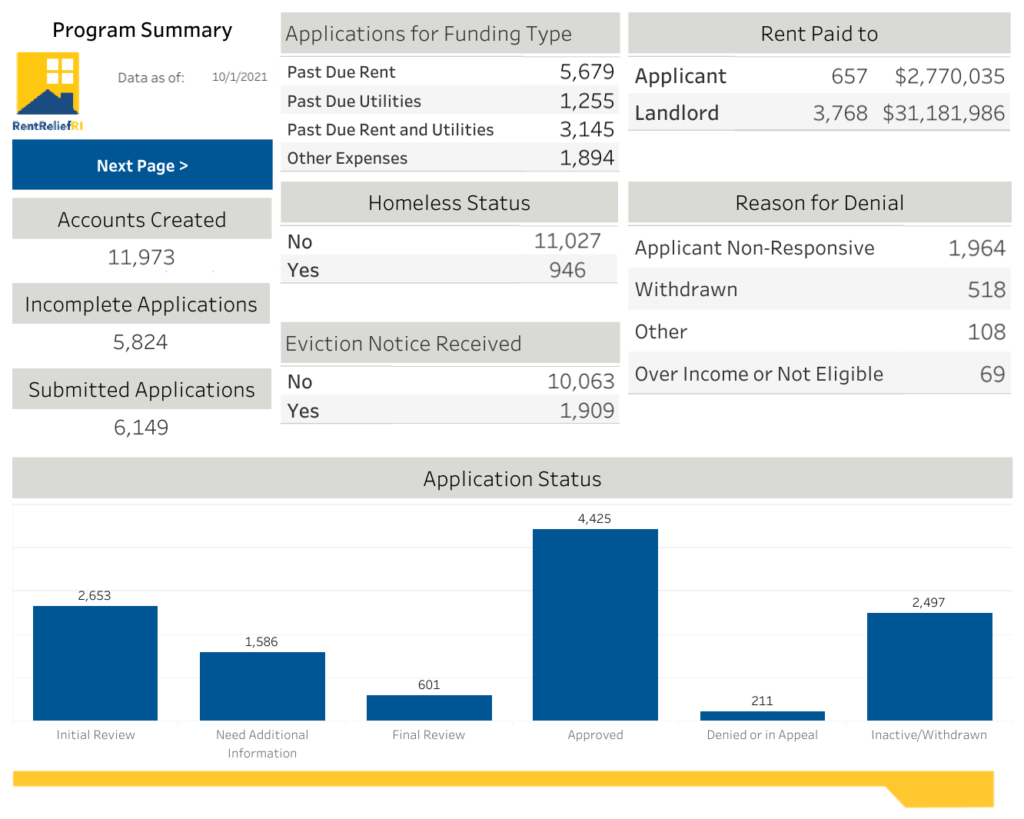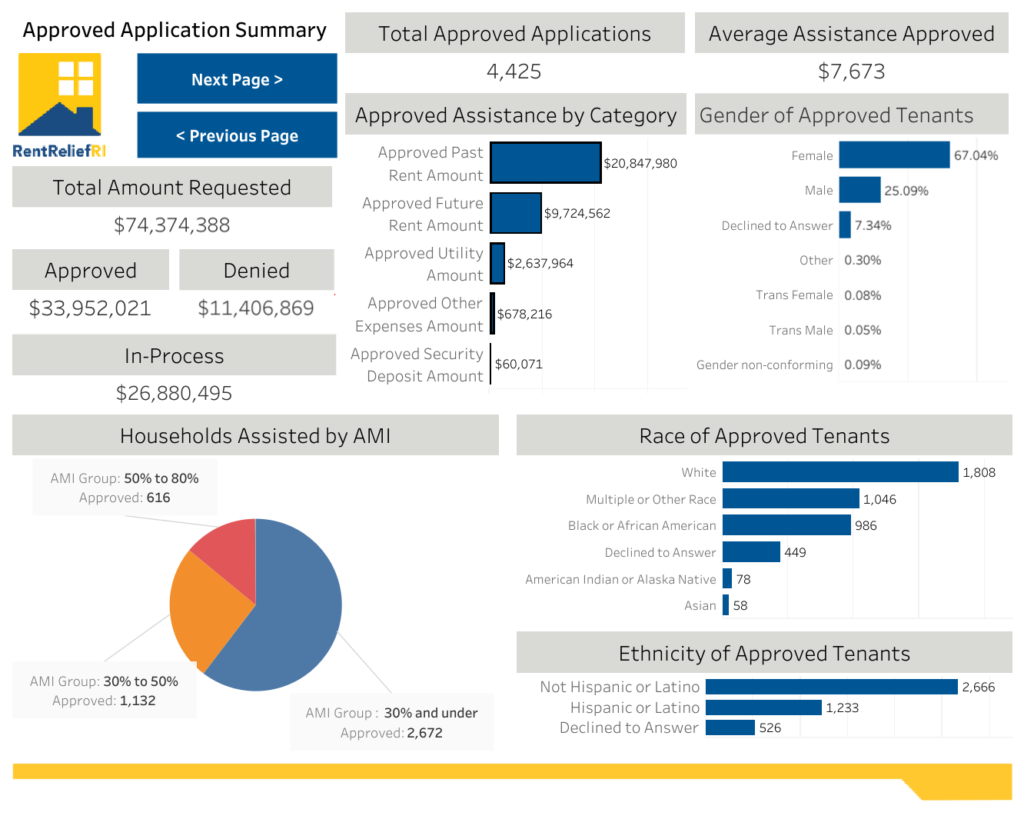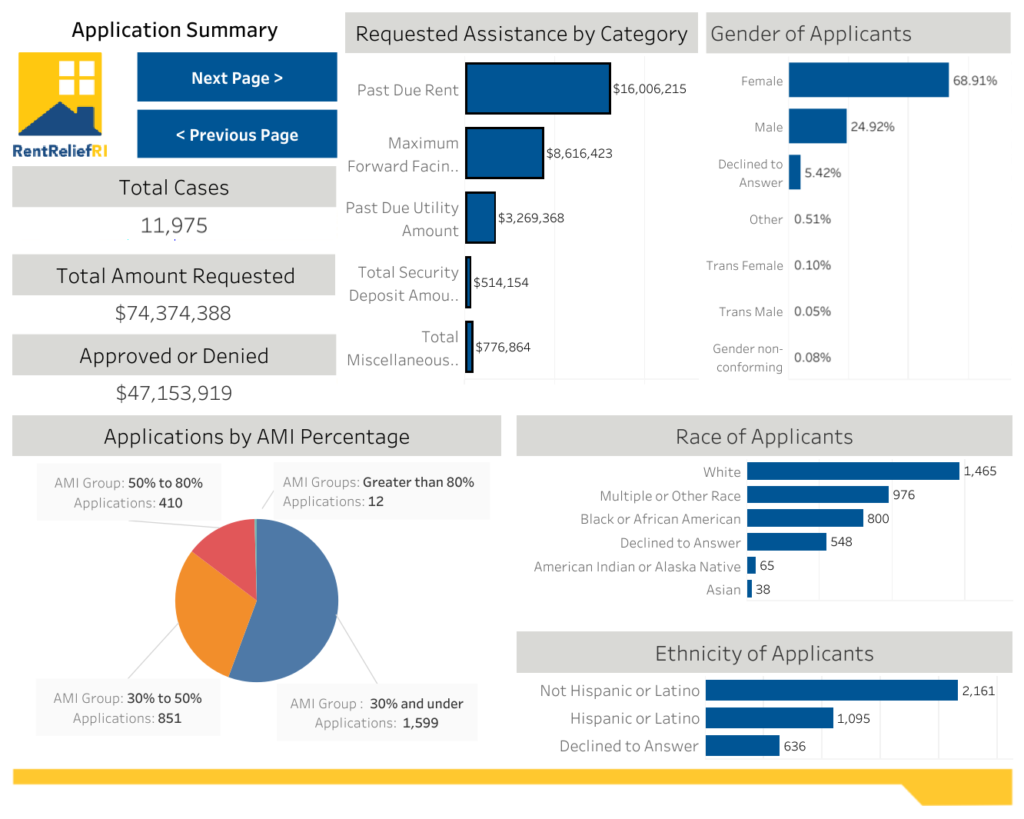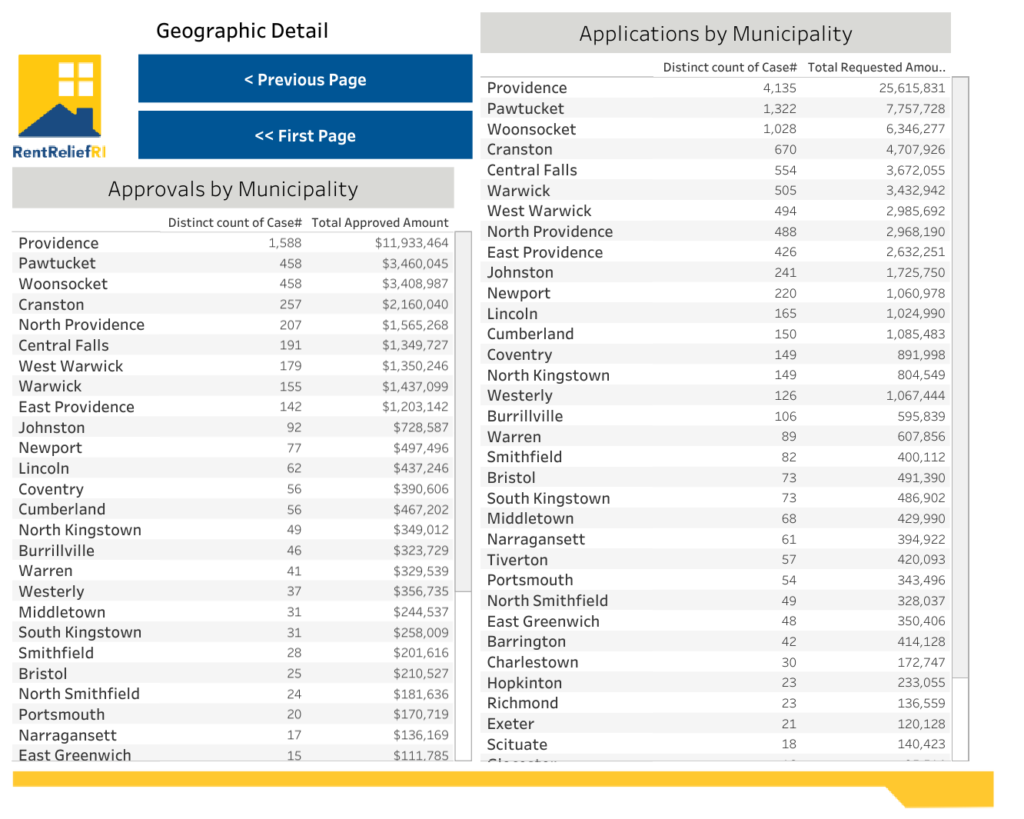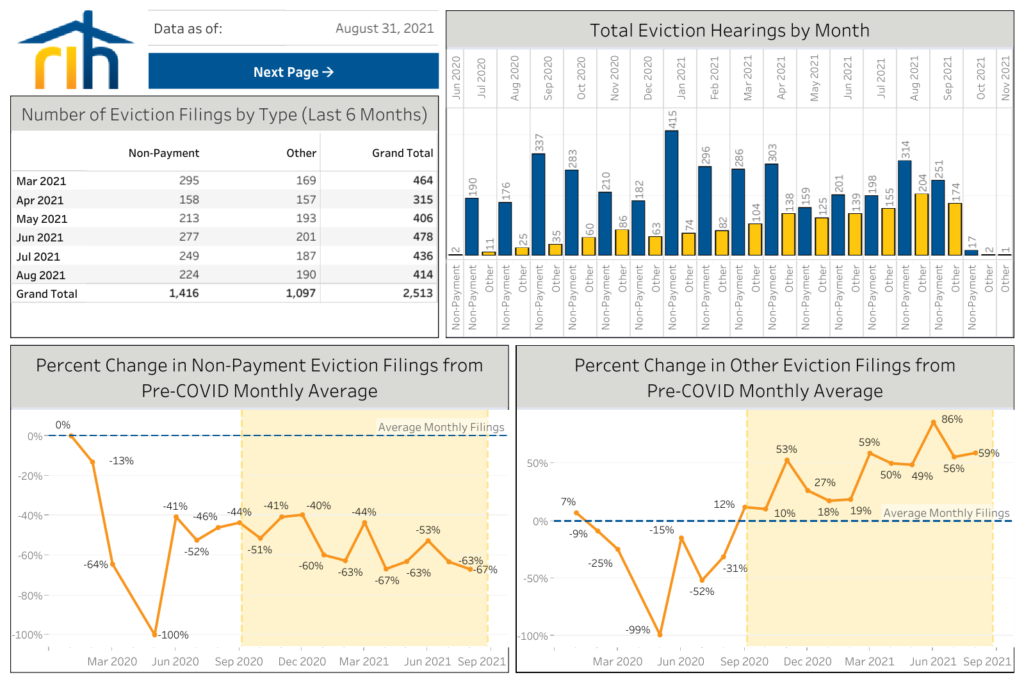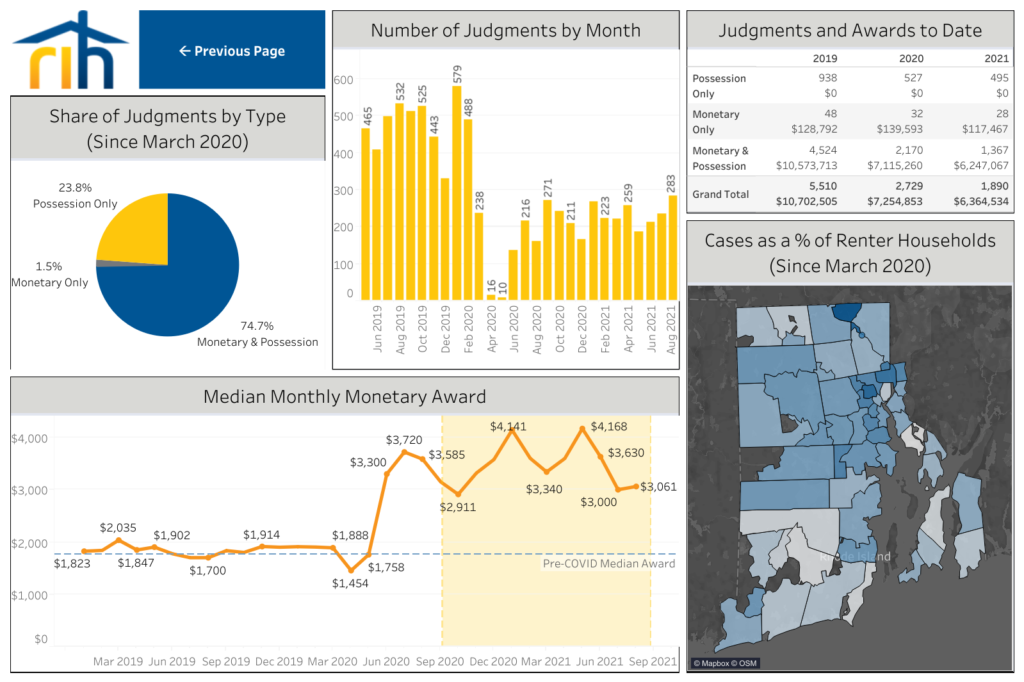Rent relief is available for RI tenants with applications accepted on the web – rihousing.com/rentreliefri – and successful applicants will receive grants that do not need to be paid back or counted as income. Money can cover back rent after April 1, 2020; up to three months of upcoming rent; a security deposit if needed; and utilities such as electricity, water, trash, and heat. Up to 18 months of assistance is available. Applications can be for rent, utilities, or both.
Applicants must have “area median income” (“AMI”) below certain limits that vary based upon location and household size; must have experienced reduction in income (including unemployment), incurred significant costs, or experienced financial hardship due directly or indirectly to the pandemic; and must be at risk of experiencing homelessness or housing instability (such as having unpaid back rent or an eviction notice).
There is a Rent Relief RI telephone call center, (855)608-8756 toll-free, operating Monday through Friday 8:30am–5:30pm and Saturday 8:00am–1:00pm. “All of our partner materials are available in English and Spanish. When you call the call center, you can get English, Spanish, and Portuguese help right away. You can get almost any other language if you say ‘I need this language’ and you hold for a few minutes; we use a language service at the call center. The application is available in, I don’t know, like 147 different languages, there’s just a toggle button at the top and you choose your language and that application appears there,” Christine Hunsinger, chief strategy and innovation officer at RI Housing, told Motif in an interview. “I’ve only, in the whole time we’ve been running this program, run into one instance where it took us a couple of days to find someone who spoke a very specific dialect of an African language. We had to go out of state for that. I don’t remember what it was called, but we did it. I will tell you it took way longer than I was comfortable with, but we can do most languages pretty quickly.”
RI Housing lists a number of non-profit partner organizations who can help applicants through the process, providing advice and counseling as well as services such as printing and scanning of documents. Statewide partners providing legal advice are the Center for Justice and Rhode Island Legal Services, and a number of other-than-legal services partners include the Center for Southeast Asians, Crossroads RI, ONE Neighborhood Builders, Tri-County Community Action Agency, East Bay Community Action Program, Comprehensive Community Action Program (CCAP), and Family Service of RI.
Congress specifically made undocumented immigrants eligible for the rent relief program, Hunsinger said. “We work very closely with a number of partners who work in the undocumented community because they’re eligible, too, and folks who are undocumented tend to be hesitant about government programs, and we want them to come in and apply.” Where documents are lacking, she said, the program allows for self-attestation and even waiver of the requirement. “We don’t ask anybody their status…I run into quite a few partners who will call me and say, ‘Look, I’ve got an undocumented family, but they don’t have a photo ID.’ And so I just waived it. They’re working with the family, they they’re involved with the family, and they help them fill out the forms, and they tell me what they can’t provide. And they tell me why and we waive. It is one of the few programs. There were a lot of federal programs during the pandemic that folks who were undocumented were not eligible for. This one they are eligible for, but it’s not simple. You have to have to gain a community’s trust that doesn’t doesn’t trust the government. So it’s hard, and that’s where those on the ground partners are so important.”
Hunsinger said RI Housing has invested heavily in technology to process applications and report on the status of the program. As of a few weeks ago, “All the documents can be signed electronically on the computer. We actually had the the technology company upgrade it. It used to be that you had to download the attestation and fill it out and scan it back in, but now you can do it right in the [web] system so you don’t require a printer,” she said. “As far as scanning documents into the system, you can do that, or you can upload them from your computer. The other thing you can do is take a picture on your phone, because we know a lot of folks have cell phones and they’re they’re quite good with them. You can e-mail it to either your caseworker or e-mail it to a partner who can upload it for you. So we’ll take it any way we can get it.”
According to the program “dashboard” Hunsinger said is updated every weekday morning, as of Oct 1 there have been 11,795 accounts created and 6,149 completed applications, with $31,181,986 paid to 3,768 landlords and $2,770,035 paid to 657 tenants. RI Housing also maintains a web report on evictions in the state.
“The federal government requires a prioritization system, so the people who have eviction notices, who have been out of work the longest, and who have the least income, go first,” Hunsinger said. “We think the eviction notice piece is particularly important, because if you’ve got a hearing, we want to try to pay that out and prevent that hearing from going forward so that you can stay in your home.”
Processing is now very quick, Hunsinger said. “From the time it’s assigned to a case manager, we’ll do all of our outreach attempts within 10 days. The landlord we contact three times within five days and, if they don’t respond, then we can make it direct pay to tenants, and the tenants get 10 days to respond to our our outreach efforts and provide what they need” to complete an application. “At the end of 10 days, you’ve either completed the application and we have what we need to make a determination, then we either approve or deny it based on your eligibility, or you haven’t done that, and haven’t responded and we’ll deny it.”
Changes authorized from the federal level have simplified the process, Hunsinger said, eliminating much of the initial complexity. “We asked you about your income because it is a means-tested program. If you live in a qualified census tract – that’s a [US Housing and Urban Development] designation – where the majority of renters are 80% of area median income or below, we don’t ask you for income documentation anymore. That’s one of the changes that we’ve made to make it simpler. So if you live in one of those areas who don’t have to provide proof of your income.” The web site should automatically determine from the applicant address whether the census tract exemption applies, she said. A similar exemption applies to anyone on a qualifying government assistance program, she said, including SNAP (“food stamps”), WIC, RI Works.
“The [RI] program has not been without its problems. We came up and we had a technology failure, we had to procure a new vendor and start over. So I understand that there’s been a backlog and a lag in processing. We learn stuff. Every time we interact with a group of people, we take their feedback very seriously. We have made a number of changes to make it simpler to make it more accessible. We’ve increased our presence in the community. So aside from those partners, we do on-site events. Last night, we were at an addiction clinic in Pawtucket, where folks from Pawtucket could come and get help completing their application. If we could get it finished there, we had somebody there and could look at it and approve it. We could start applications with with folks who hadn’t started yet. So we’ve done a number of things: really, really pushed it so that we are more accessible, more present and make it easier on the on the folks who need the money.”
The American Rescue Plan, passed by Congress and signed into law by President Joe Biden in March 2021, contained a wide variety of pandemic economic relief programs, but a major provision allocated $21.6 billion to forestall evictions of tenants behind on their rent and $10 billion to homeowners behind on their mortgages, as well as $4.5 billion to those behind on utility payments. A study published by the Federal Reserve Bank of Philadelphia estimates that by December 2021 such debt nationally will reach $18.6 billion for 2 million households, which is 6% of all households, with an average of $9,300 per household.
